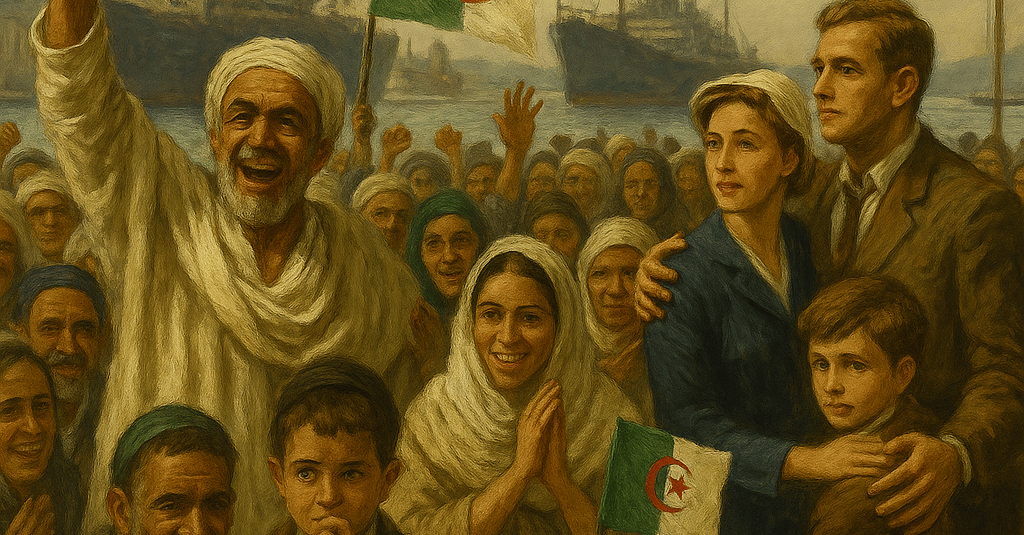Algeria and the Black Panthers: A Haven for Revolutionaries in the 1970s
Discover how Algeria, fresh from its independence, offered refuge to the Black Panther Party in the 1970s. Learn how Algiers became the “Mecca of revolutionaries” and a hub of global solidarity.
ENGLISH THROUGH HISTORY
Adi English
4 min read


🌍 Story 6 – Algeria & the Black Panthers (1970s)
LEVEL 3 – Advanced
Length: (~528 words)
By the late 1960s, the Black Panther Party had become both celebrated and feared in the United States. Founded in Oakland, California, the Panthers sought to defend African American communities against police violence and systemic oppression. They launched community programs such as free breakfasts for children, health clinics, and education classes. These initiatives made them popular among the poor, but their armed patrols and revolutionary language alarmed U.S. authorities.
The FBI labeled the Panthers “the greatest internal threat to the United States.” Through its COINTELPRO program, the government infiltrated and dismantled many chapters. Leaders were arrested, jailed, or killed. One of the most visible figures, Eldridge Cleaver, fled the U.S. in 1968 after a shootout with police. After a short stay in Cuba, he arrived in Algeria in 1969, seeking refuge.
Algeria had only recently won independence from France in 1962 after a bloody eight-year war. Having endured more than a century of colonial rule, Algeria’s new leaders positioned their country as a hub for global revolutionary movements. President Houari Boumédiène opened the capital, Algiers, to activists from across the world. Soon the city became known as the “Mecca of revolutionaries.”
In 1970, Cleaver and other Panthers established the International Section of the Black Panther Party in Algiers. This office gave the group a base outside the United States. From here, the Panthers met with representatives of the Palestinian liberation movement, the African National Congress of South Africa, and Cuba’s revolutionary government. Algeria granted them housing, financial aid, and diplomatic recognition. The Panthers even received passports that allowed them to travel internationally as representatives of a movement, not fugitives.
Life in exile was not without challenges. The Panthers struggled with internal divisions, limited resources, and the difficulty of directing a U.S.-based struggle from afar. Still, the symbolism of their presence in Algeria was powerful. It showed that liberation movements could support each other across borders and that a newly independent nation could become a beacon for global solidarity.
Algeria’s support for the Black Panthers also sent a message to the world about the responsibilities of newly independent nations. Many post-colonial countries were struggling to rebuild their economies and societies, yet Algeria chose to invest its resources in global solidarity. By hosting the Panthers and other liberation groups, Algeria positioned itself as a leader of the Global South. This role inspired other African nations to see themselves not just as survivors of colonialism but as active participants in shaping a fairer international order. For the Panthers, this recognition meant that their struggle for justice in the U.S. was part of a much larger movement against racism and imperialism worldwide.
By the mid-1970s, the Panthers’ influence declined, and the International Section lost momentum. Yet their years in Algeria left a lasting impression. They proved that the struggle for racial justice in the United States was linked to broader battles against imperialism and colonialism worldwide.
The story of Algeria and the Panthers reminds us that victories in one part of the world can inspire and protect others. Algeria’s generosity to the Panthers demonstrated that a country’s commitment to freedom could extend far beyond its borders, shaping the global fight for justice in the twentieth century.
Vocabulary (10 words)
Oppression – cruel or unfair control of people.
Explanation: When groups are dominated by force or injustice.
Example: The Panthers organized against oppression.
Student example: ____________
Colonial rule – control of one country by another.
Explanation: Algeria lived under French rule for 132 years.
Example: Colonial rule ended after Algeria’s war of independence.
Student example: ____________
Exile – living away from one’s country, often for political reasons.
Explanation: Leaders like Cleaver lived in exile to escape persecution.
Example: The writer spent years in exile.
Student example: ____________
Revolutionary – someone seeking radical political change.
Explanation: The Panthers and Algerians both described themselves as revolutionary.
Example: The revolutionary spoke to a large crowd.
Student example: ____________
Liberation – the act of becoming free from control.
Explanation: Algeria’s war was a fight for liberation from France.
Example: They celebrated liberation after years of struggle.
Student example: ____________
Recognition – official acceptance or approval.
Explanation: Algeria gave recognition to the Panthers as a political group.
Example: The new country sought recognition from others.
Student example: ____________
Imperialism – powerful nations controlling weaker ones.
Explanation: Anti-imperialism was central to Algeria’s policies.
Example: They resisted imperialism together.
Student example: ____________
Hub – a central place of activity.
Explanation: Algiers was a hub for global revolutionaries.
Example: The city became a hub of trade and culture.
Student example: ____________
Solidarity – unity and support between groups.
Explanation: When movements or nations stand together.
Example: There was solidarity among liberation movements.
Student example: ____________
Freedom – the right to live without unfair control.
Explanation: Both the Panthers and Algerians sought freedom from oppression.
Example: They dreamed of freedom for their people.
Student example: ____________
Exercises (Level 3 – Advanced)
Comprehension
What did the Black Panthers do in their communities?
Why did Eldridge Cleaver flee the U.S.?
What role did Algeria play for liberation movements?
What did Algeria provide to the Panthers?
Why was Algiers called the “Mecca of revolutionaries”?
Multiple Choice
Who was Algeria’s president in the 1970s?
a) Charles de Gaulle b) Houari Boumédiène c) Nelson Mandela d) Anwar Sadat
When did Algeria gain independence from France?
a) 1945 b) 1954 c) 1962 d) 1970
Where did Eldridge Cleaver live before arriving in Algeria?
a) Cuba b) Mexico c) France d) Ghana
What was Algiers known as in this period?
a) City of Peace b) Mecca of revolutionaries c) African Capital d) City of Gold
Why did the Panthers struggle in exile?
a) Lack of support from Algeria b) Internal divisions and distance from the U.S.
c) Expulsion by the U.N. d) Too much financial aid
Fill in the Blank
The Black Panthers fought against racial _______.
Algeria had lived under French _______ rule.
Eldridge Cleaver lived in _______ before Algeria.
The Panthers opened their International _______ in Algiers.
Liberation movements resisted _______ together.
True/False
Algeria gave recognition to the Panthers.
The Panthers only worked in the U.S.
Algiers became a hub for global movements.
Cleaver returned to the U.S. immediately after independence.
Algeria’s own liberation war ended in 1962.
Discussion
Why do you think Algeria welcomed the Black Panthers?
How did Algeria’s history shape its foreign policy?
What challenges do movements face in exile?
Can solidarity between nations still matter today?
What lessons can be learned from this story?
